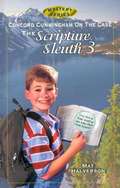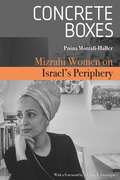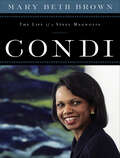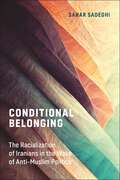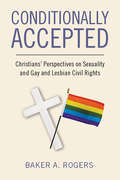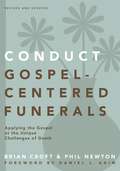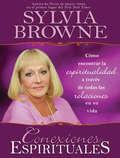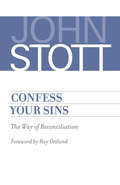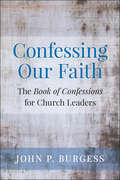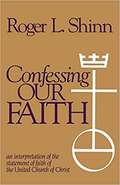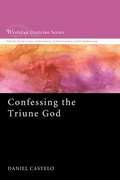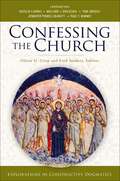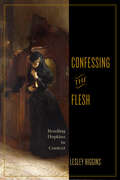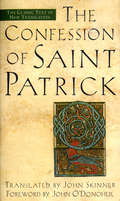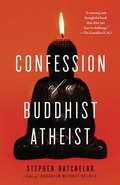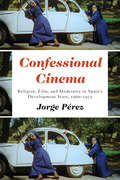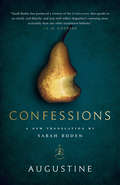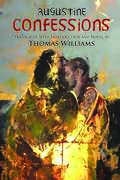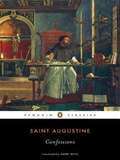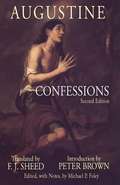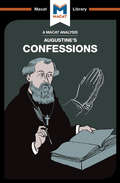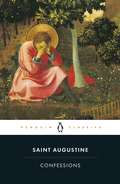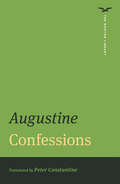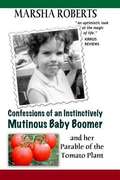- Table View
- List View
Concord Cunningham on the Case (The Scripture Sleuth #3)
by Mathew HalversonWho stole the lumberjack statue? Is a peanut butter sandwich really powering the digital clock, or is it just a science fair scam? Why is there a mysterious skydiver in Pine Tops? Concord Cunningham can crack all the cases, but can you? Only if you're ready to look up clues in your Bible! In this third volume of unique Scripture Sleuth mysteries, Concord once again faces an exciting new case in each chapter. Though Concord always solves the mystery, he never gives away the solution. Instead, he reveals the location of a Bible verse which holds the mystery's final clue. Then it's up to you to look up the clue and crack the case! Not sure about your answer? No problem. The solutions are at the back of the book. Scripture Sleuth 3 also includes "The Greatest Case", which brings Concord face to face with another Scripture Sleuth. Together, they investigate the most important case ever. These timeless and lighthearted mysteries are certain to make you think, make you laugh, and make looking up Bible verses irresistibly fun!
Concrete Boxes: Mizrahi Women on Israel's Periphery (Raphael Patai Series in Jewish Folklore and Anthropology)
by Pnina Motzafi-Haller Virginia R DominguezConcrete Boxes: Mizrahi Women on Israel’s Periphery offers a rich depiction of contemporary life in one marginalized development town in the Israeli Negev. Placing the stories of five women at the center, author Pnina Motzafi-Haller depicts a range of creative strategies used by each woman to make a meaningful life within a reality of multiple exclusions. These limitations, Motzafi-Haller argues, create a "concrete box," which, unlike the "glass ceiling" of the liberal feminist discourse, is multi-dimensional and harder to break free from. As the stories unfold, the reader is introduced to the unique paths developed by each of five women in order to keep their families and community together in the face of the stigmatic and hegemonic narratives of Israelis who seldom set foot in their social and geographic periphery. Motzafi-Haller’s ethnography includes the daily struggles of Nurit, a single mother with a drug-addicted partner, in her attempt to make ends meet and escape social isolation; Ephrat’s investment in an increasingly religious-observant lifestyle; the juggling acts of Rachel, who develops a creative mix of narratives of self, using middle-class rhetoric in reimagining a material reality of continued dependence on the welfare system; the rebellious choices of Esti, who at thirty-five, refuses to marry, have children, or keep a stable job, celebrating against all odds a life of gambling, consumption beyond her means, and a tight and supportive social network; and the life story of Gila, who was born in Yeruham but was able to "escape" it and establish herself in middle-class life as a school principal. Taken together, these intimate narratives ask us to consider both the potential and limitations of post-colonial feminist insights about the manner in which knowledge is produced. Concrete Boxes offers sustained reflection about Israeli reality rarely documented in scholarly work and a thought-provoking theoretical exploration of the ways in which individual agency encounters social restrictions and how social marginality is reproduced and challenged at the same time.
Condi: The Life of a Steel Magnolia
by Mary Beth BrownAn in-depth look at the life, faith, and achievements of one of America’s most fascinating women.“One day I’ll be in that house,” said ten-year-old Condoleezza Rice as she gazed across the White House’s expansive front lawn.Of course, Condi made good on that promise. With poise and gracefulness—combined with an iron will and determination—rarely seen in Washington, Rice has become one of the most iconic and influential figures on the world stage. This is her story.Condi provides an in-depth study of the life, faith, and achievements of one of America’s most fascinating women. From her humble beginnings in segregated Alabama to her academic career, from her first days in Washington to her appointment as Secretary of State and beyond, Condi investigates Rice’s rise to political prominence. Drawing from in-depth research, Mary Beth Brown explores how Condi’s parents, mentors, faith, and defining moments have helped her grow into a position of power and global influence.Here is a story of inspiration, of principle, and of the limitless opportunities for those who pursue their dreams with unfailing hope and dogged determination.
Conditional Belonging: The Racialization of Iranians in the Wake of Anti-Muslim Politics
by Sahar SadeghiA compelling account of how race and politics have affected Iranian immigrants in the United Statesand GermanyIranians have a complex and contradictory relationship with race. Though categorized as “white” by the US census, many Iranian Americans remain marginalized, and experience racial and political stigma daily. On the other hand, Iranian Germans who have been in Germany for decades, and are typically regarded as 'good foreigners,' continue to experience marginality and discrimination illustrating the limitations of integration and citizenship. Conditional Belonging explores these apparent contradictions through a comparative analysis of the Iranian diasporic experience in the United States and Germany, focusing particularly on the different processes of racialization of the immigrants.Drawing from eighty-eight interviews with first- and second-generation Iranians living in California and Hamburg, Sahar Sadeghi illuminates how international events, global political policy, and national social climates influence the extent to which Iranians define themselves as members of their adopted nations. All these factors lead to radically different experiences of belonging, or more specifically “conditional belonging,” for Iranians living in Western nations—while those in America might have situational access to whiteness, this is not always available to Iranians in Germany. The combination of these experiences results in perceptions, narrations, and experiences of what the author calls “being but not belonging.” Conditional Belonging is an important and timely book that broadens our understanding of how unpredictable and fluid a sense of belonging to a country can be.
Conditionally Accepted: Christians' Perspectives on Sexuality and Gay and Lesbian Civil Rights
by Baker A. RogersThis book explores Mississippi Christians’ beliefs about homosexuality and gay and lesbian civil rights and whether having a gay or lesbian friend or family member influences those beliefs. Beliefs about homosexuality and gay and lesbian rights vary widely based on religious affiliation. Despite having gay or lesbian friends or family members, evangelical Protestants believe homosexuality is sinful and oppose gay and lesbian rights. Mainline Protestants are largely supportive of gay and lesbian rights and become more supportive after getting to know gay and lesbian people. Catholics describe a greater degree of uncertainty and a conditional acceptance of gay and lesbian rights; clear differences between conservative and liberal Catholics are evident. Overall, conservative Christians, both evangelical Protestants and conservative Catholics, hold a religious identity that overshadows their relationships with gay and lesbian friends or family. Conservative religion acts as a deterrent to the positive benefits of relationships with gay and lesbian people.
Conduct Gospel-Centered Funerals: Applying the Gospel at the Unique Challenges of Death (Practical Shepherding Series)
by Brian Croft Daniel L. Akin Phil A. NewtonBring Gospel Hope in the Midst of Death The phone rings: “Pastor, can you do my mother’s funeral?” Or, “Please help us—our baby just died.” Death comes unexpectedly, giving you two to three days of time to prepare a sermon—in the midst of caring for a grieving family. This helpful book walks a pastor through the logistics of memorial services, burials, and working with funeral homes—using the four P’s: Plan, Prepare, Preach, and Perform. It shows how to magnify Christ and the gospel in the midst of all the details, demands, and sorrow that surrounds the death of a loved one. The Practical Shepherding series of books provides pastors and ministry leaders with advice and practical help to do the work of pastoral ministry in a local church. In Conduct Gospel-Centered Funerals, experienced pastors Brian Croft and Phil A. Newton offer readers a concise guide to conducting funerals that glorify God and offer a timely message of hope.
Conexiones Espirituales: Cómo Encontrar La Espiritualidad A Través De Todas Las Relaciones En Su Vida (Col. Sylvia Browne Ser.)
by Sylvia BrowneHave you ever wondered why some relationships are wonderful and others are just catastrophic and tragic? Why do we get along with some people and with others just seem to constantly engage in bitter fighting? In this fascinating and helpful book, internationally renowned psychic Sylvia Browne examines why we form our relationships with certain individuals . . . for better or for worse. From the lifelong connection of a loving marriage to the short and bitter agony of a brief encounter leading to divorce and heartache, she reveals why we have joyful and happy relationships on the one hand and chaotic, hateful and painful ones on the other. Sylvia takes us on a remarkable excursion that covers all the different types of relationships we’ll encounter in life. From our childhood experiences to our golden years, she helps us see why we form both good and bad unions, and she also explores how our themes and charts of life can interact with others in both positive and negative ways—creating either lifelong love or friendship or a situation doomed for disaster. Sylvia enables us to come to a true understanding of why we have certain compulsions and attractions for some people while being totally repulsed by others. By utilizing Sylvia’s marvelous insights, we can all learn how to cultivate our relationships (and sift the wheat from the chaff) in order to live a happier and more fulfilling life.
Confess Your Sins: The Way of Reconciliation
by John StottAn evangelical classic for a new generation of Christian readers Back in print for the first time in many years, John Stott's classic treatise on confession discusses a neglected Christian practice. Though the Bible clearly teaches that confession is a necessary part of the redemption story, many Christians are uncertain how and to whom they should confess their sins. Stott offers vital answers in Confess Your Sins: The Way of Reconciliation. After presenting the necessity of confession, Stott distinguishes between three types of confession—in secret to God, in private to a person whom our sin has injured, and in public in the presence of a Christian congregation. He shows how this threefold distinction is biblically grounded, and he critically examines the practice of confessing to a priest. Offering assurance of forgiveness to Christians, this little book opens the door to fruitful conversation about the practice of confession.
Confess Your Sins: The Way of Reconciliation
by John StottAn evangelical classic for a new generation of Christian readers Back in print for the first time in many years, John Stott's classic treatise on confession discusses a neglected Christian practice. Though the Bible clearly teaches that confession is a necessary part of the redemption story, many Christians are uncertain how and to whom they should confess their sins. Stott offers vital answers in Confess Your Sins: The Way of Reconciliation. After presenting the necessity of confession, Stott distinguishes between three types of confession—in secret to God, in private to a person whom our sin has injured, and in public in the presence of a Christian congregation. He shows how this threefold distinction is biblically grounded, and he critically examines the practice of confessing to a priest. Offering assurance of forgiveness to Christians, this little book opens the door to fruitful conversation about the practice of confession.
Confessing Our Faith
by John P. BurgessHow can the Book of Confessions help elders and lay leaders when they face challenging situations within their congregations? John P. Burgess offers answers in Confessing Our Faith. Using the confessions as a framework, Burgess covers areas of ministry such as stewardship, evangelism, discipleship, and conflict resolution, offering in each case ways in which the lay leader can respond. A unique and practical reference, Confessing Our Faith is designed to aid church leaders in understanding how their work can be informed by the confessional documents.
Confessing Our Faith: An Interpretation Of The Statement Of Faith Of The United Church Of Christ
by Roger L. ShinnThis "reinterpretation" of the Statement of Faith adopted by the United Church of Christ in 1959 includes a description of the process that led to the original interpretation, and boldly indicates where the statement expresses firm convictions and where it encourages continuing discussions.
Confessing The Triune God
by Daniel CasteloAt the heart of Christian witness is the confession of the triune God. Confessing the Triune God seeks to extend a conversation on Christianity's first article by way of locating Trinitarianism in the life of the worshiping faithful. It does so through an ongoing dialectic between broad and particular confessional lines. Its breadth is constituted by an ongoing assessment of ecumenical consensus and scholarly debates related to Trinitarianism; its repeated framing stems from and returns to the Wesleyan and Methodist family of traditions. <P><P>In this way, Christian commitments regarding the Trinity can be depicted for their wide appeal as well as their particular logic within a specific worshiping community. The work seeks to guide readers through a process of growing awareness of how the dogma of the Trinity is central to all that Christians say, do, and hope to be.
Confessing the Church: Explorations in Constructive Dogmatics (Los Angeles Theology Conference Series)
by ZondervanThe 2023 Los Angeles Theology Conference examines ecclesiology, that is, the doctrine about the Church. Conference contributions offer constructive proposals for understanding and confessing the doctrine of the Church with historical depth, ecumenical scope, and analytic clarity. This book contains the proceedings of the conference.
Confessing the Flesh: Reading Hopkins in Context (Victorian Literature and Culture Series)
by Lesley HigginsA new theoretical reading of the renowned poet and Jesuit priestConfessing the Flesh is an expansive, interdisciplinary analysis of how aesthetic and religious discourses function in dialogue in the work of Gerard Manley Hopkins, the celebrated Victorian-era poet and Catholic priest. Through Hopkins, Lesley Higgins reveals how religion was expressed, lived, and debated in the nineteenth century. Both a comprehensive analysis of innovative Victorian poetry and a cultural history of confession, this book builds on previous Hopkins criticism by adopting a new approach informed by feminist and Foucauldian theory. With its analysis of the cultural conditions and power relations that sustained religious belief and poetic expression in the Victorian age, Confessing the Flesh offers new insights on the perennial question of Hopkins&’s religious commitments. And with its examination of everything from theological treatises to Punch cartoons, Higgins&’s exploration of Hopkins&’s confessional modes uncovers the ways that gender and nation become implicated in confessional controversies and fleshly entanglements.
Confession of Saint Patrick: The Classic Text in New Translation
by John SkinnerThe autobiography of one of the most popular saints in history, now available in a new translation.Beyond being recognized as the patron saint of Ireland (perhaps for having chased some nonexistent snakes off the Emerald Isle), little else is popularly known about Saint Patrick. And yet, Patrick left behind a unique document, his Confession, which tells us much about both his life and his beliefs. This autobiography, originally written in the fifth century, and short by modern standards, is nonetheless a work that fascinates with its glimpse into the life of an intriguing man, and inspires with its testament of faith. Here, in this new edition from internationally acclaimed translator John Skinner, the character of Patrick, his era, and his world vividly come to life. Also included in this volume is the only other document known to have been written by Patrick, a letter he wrote to the soldiers of Coroticus--also Christians--who had raided parts of Ireland and taken away prisoners who were then sold into slavery. This letter is a wonderful demonstration of Patrick's rhetorical fire. Quite irate, Patrick harangues his fellow Christians, and the results are every bit as autobiographically revealing as the Confession. John O'Donohue, author of Anam Cara, provides an insightful foreword that re-creates the unique spirituality of Patrick and of the Irish people, and shows how it applies to our lives today.From the Paperback edition.
Confession of a Buddhist Atheist
by Stephen BatchelorWritten with the same brilliance and boldness that madeBuddhism Without Beliefsa classic in its field,Confession of a Buddhist Atheistis Stephen Batchelor#x19;s account of his journey through Buddhism, which culminates in a groundbreaking new portrait of the historical Buddha. Stephen Batchelor grew up outside London and came of age in the 1960s. Like other seekers of his time, instead of going to college he set off to explore the world. Settling in India, he eventually became a Buddhist monk in Dharamsala, the Tibetan capital-in-exile, and entered the inner circle of monks around the Dalai Lama. He later moved to a monastery in South Korea to pursue intensive training in Zen Buddhism. Yet the more Batchelor read about the Buddha, the more he came to believe that the way Buddhism was being taught and practiced was at odds with the actual teachings of the Buddha himself. Charting his journey from hippie to monk to lay practitioner, teacher, and interpreter of Buddhist thought, Batchelor reconstructs the historical Buddha#x19;s life, locating him within the social and political context of his world. In examining the ancient texts of the Pali Canon, the earliest record of the Buddha#x19;s life and teachings, Batchelor argues that the Buddha was a man who looked at human life in a radically new way for his time, more interested in the question of how human beings should live in this world than in notions of karma and the afterlife. According to Batchelor, the outlook of the Buddha was far removed from the piety and religiosity that has come to define much of Buddhism as we know it today. Both controversial and deeply personal,Confession of a Buddhist Atheistis a fascinating exploration of a religion that continues to engage the West. Batchelor#x19;s insightful, deeply knowledgeable, and persuasive account will be an essential book for anyone interested in Buddhism.
Confessional Cinema: Religion, Film, and Modernity in Spain’s Development Years, 1960–1975
by Jorge PerezIn Confessional Cinema, Jorge Pérez analyzes how cinema engaged the shifting role of religion during the last fifteen years of Francisco Franco’s dictatorship. Pérez interrogates the assumption that after 1957, when the Franco regime recast itself in a secular and modernizing fashion, religion vanished from the cultural field. Instead, Spanish cinema addressed the transformation within Spanish Catholicism following Vatican II and Spain’s modernization processes. Confessional Cinema offers the first analysis of a neglected body of Spanish films, "nun films," which focus on the active role of religious women in the transformation of Spanish Catholicism. Pérez argues that commercial films, despite being less aesthetically accomplished, delved more than oppositional, art-house films into the fluctuating zeitgeist of the development years regarding the transformations within Spanish Catholicism. Confessional Cinema offers a provocative and original analysis of the significance of religion not from a theological point of view, but rather as a socio-political force and cultural determinant in the Spanish public sphere of this period, known as desarrollismo (development years) from 1960-1975.
Confessions
by Sarah Ruden AugustineOne of the great works of Western literature, from perhaps the most important thinker of Christian antiquity, in a revolutionary new translation by one of today’s leading classicists Sarah Ruden’s fresh, dynamic translation of Confessions brings us closer to Augustine’s intent than any previous version. It puts a glaring spotlight on the life of one individual to show how all lives have meaning that is universal and eternal. In this intensely personal narrative, Augustine tells the story of his sinful youth and his conversion to Christianity. He describes his ascent from a humble farm in North Africa to a prestigious post in the Roman Imperial capital of Milan, his struggle against his own overpowering sexuality, his renunciation of secular ambition and marriage, and the recovery of the faith his mother had taught him during his earliest years. Augustine’s concerns are often strikingly contemporary, and the confessional mode he invented can be seen everywhere in writing today. Grounded in her command of Latin as it was written and spoken in the ancient world, Sarah Ruden’s translation is a bold departure from its predecessors—and the most historically accurate translation ever. Stylistically beautiful, with no concessions made to suit later theology and ritual, Ruden’s rendition will give readers a startling and illuminating new perspective on one of the central texts of Christianity.Praise for Sarah Ruden “Ruden’s work emphasizes the complexity inherent in translation; she lingers on some of the most challenging concepts and explicates the historical and linguistic context for her work, debunking both myths and poor prior interpretations.”—Publishers Weekly (starred review), on The Face of Water “The best translation yet, certainly the best of our time.”—Ursula K. Le Guin, on The Aeneid “An Aeneid more intimate in tone and soberer in measure than we are used to—a gift for which many will be grateful.”—J. M. Coetzee, on The Aeneid
Confessions
by Augustine"Williams's masterful translation satisfies (at last!) a long-standing need. There are lots of good translations of Augustine's great work, but until now we have been forced to choose between those that strive to replicate in English something of the majesty and beauty of Augustine's Latin style and those that opt instead to convey the careful precision of his philosophical terminology and argumentation. Finally, Williams has succeeded in capturing both sides of Augustine’s mind in a richly evocative, impeccably reliable, elegantly readable presentation of one of the most impressive achievements in Western thought—Augustine's Confessions." —Scott MacDonald, Professor of Philosophy and Norma K. Regan Professor in Christian Studies, Cornell University
Confessions
by Garry Wills Augustine Of HippoGarry Wills is an exceptionally gifted translator and one of our finest writers on religion. His bestselling Penguin Lives biography, Saint Augustine, received widespread and glowing reviews, many of which noted his masterful translations of the famed fourth- century bishop's works. Now, reading with fresh, keen eyes, Wills applies his unparalleled talents and his superb gifts of analysis and insight to this ambitious and complete translation of Saint Augustine's Confessions. Removed by time and place but not by spiritual relevance, Confessions is one of the most resonant texts in the Western canon, and continues to influence contemporary religion, languages, and thought.
Confessions
by Saint Augustine Peter Brown F. J. Sheed Michael P. FoleyLike the first Hackett edition of the Augustine's Confessions , the second edition features F. J. Sheed's remarkable translation of this classic spiritual autobiography with an Introduction by noted historian of late antiquity Peter Brown. New to this edition are a wealth of notes on literary, philosophical, biblical, historical, and liturgical topics by Michael P. Foley, an Editor's Preface, a map, a timeline, paragraph numbers in the text, a glossary, and a thorough index. The text itself has been completely reset, with textual and explanatory notes placed at the foot of the page for easy reference.
Confessions
by Jonathan TeubnerSt. Augustine’s Confessions is one of the most important works in the history of literature and Christian thought. Written around 397, when Augustine was the Christian bishop of Hippo (in modern-day Algeria), the Confessions were designed both to spiritually educate those who already shared Augustine’s faith, and to convert those who did not. Augustine did this through the original maneuver of writing what is now recognized as being the first Western autobiography – letting readers share in his own experiences of youth, sin, and eventual conversion. The Confessions are a perfect example of using reasoning to subtly bring readers around to a particular point of view – with Augustine inviting them to accompany him on his own spiritual journey towards God so they could make their own conversion. Carefully structured, the Confessions run from describing the first 43 years of Augustine’s life in North Africa and Italy, to discussing the nature of memory, before moving on to analyzing the Bible itself. In order, the sections form a carefully structured argument, moving from the personal to the philosophical to the contemplative. In the hundreds of years since they were first published, theuy have persuaded hundreds of thousands of readers to recognize towards the same God that Augustine himself worshipped.
Confessions
by Saint Augustine'Give me chastity and continence, but not yet'The son of a pagan father and a Christian mother, Saint Augustine spent his early years torn between conflicting world-views. The Confessions, written when he was in his forties, recounts how, slowly and painfully, he came to turn away from his youthful ideas and licentious lifestyle to become one of Christianity's most influential thinkers. A remarkably honest spiritual autobiography, the Confessions also addresses fundamental issues of Christian doctrine, and many of the prayers and meditations it includes are still an integral part of the practice of the faith today.Translated with an Introduction by R. S. PINE-COFFIN
Confessions (The Norton Library #0)
by AugustineAbout Peter Constantine’s translation “There are times when Augustine seems all too self-consciously in control of his performance, but there are moments when the role of penitent sinner turned ecstatic worshipper ceases to be a role and becomes simply the naked truth of the man himself. The deep strength of Peter Constantine’s translation is that he has matched Augustine’s sincerity with his own.” —JACK MILES, author of God: A Biography
Confessions Of An Instinctively Mutinous Baby Boomer: And Her Parable Of The Tomato Plant
by Marsha RobertsMarsha Roberts was never afraid to be bold because she had a secret. She knew if she stumbled, angels would catch her. She had a connection to God that seemed almost magical. For decades, angels and miracles had worked for her better than a credit card with no limit. All of that changed without warning. They called it The Recession of 2008, but like millions of other people, it was in-your-face personal to Marsha. She was on the verge of losing everything. But worst of all, in the frantic pursuit to keep her head above water, she felt her sense of self, her own personal magic, slip away. If she was going to get her family through this crisis, she was going to have to become the sassy, mutinous gal she had once been - the one who believed in miracles. And the only way to do that was to solve the profound mystery of how God had helped her beat practically impossible odds time and again. There were clues in the oddest places: in a tomato plant and a Barbie doll, in an ICU and a frozen windshield, in the Alaskan sun and a Mediterranean piazza. Even in her dog Smokey. She had to discover the key to what it all meant so she could find her way back. Back to that magical, powerful and spiritual connection. Everything she had fought for and believed in was at stake. Marsha's style of writing makes you feel as if you're with a trusted friend, sharing coffee and life lessons. This is a book that belongs on your nightstand.
